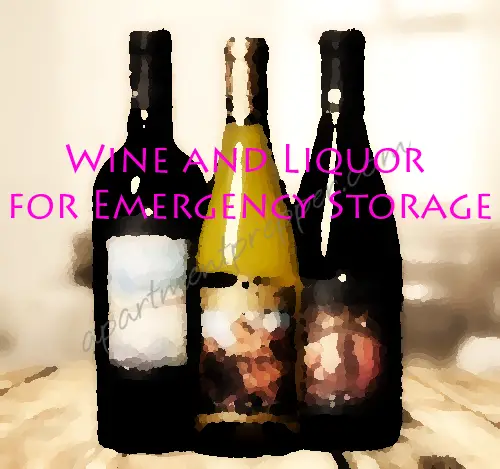This post is by Bernie Carr, apartmentprepper.com
Alcohol is often mentioned in preparedness and survival discussions. Many experts recommend storing bottles in your emergency supplies.
Why include alcoholic beverages for storage?
- Wine has health benefits
- Wine can be used for cooking and can be fermented into vinegar
- Hard liquor can be used for disinfecting, due to the high alcohol content.
- Alcohol can also be used as pain relief, when there is no anesthesia around
- Alcohol can help fuel a fire.
- Social aspects, such as a celebration or morale booster
- Barter
(I left out “warmth in freezing temperatures” because drinking alcohol may make you feel warm initially, giving temporary relief, but in reality lowers your core temperature.)
Proper Storage of Wine
I am not a wine connoisseur, and I used to think that all wines age well. I noticed we had a few bottles from many years ago that were gathering dust in the kitchen so I decided to read up on the subject. I found out that modern, cheap to moderately priced wines are made to be used within two years of the date on the bottle. Fine, expensive wines are the ones that tend to age well IF stored properly.
Bottle position: Bottles should be stored horizontally. That is why wine racks usually store wine bottles on their side. The reason for this is the cork will dry out quickly when the bottle is standing up, allowing oxygen to enter the bottle and hasten spoilage. Even when lying down, one side of the cork will still dry out at some point. There are exceptions. Champagne and sparkling wines should be stored upright.
Humidity: Wine experts recommend no more than 75% for proper storage
Temperature: Wine is very susceptible to changes in temperature and humidity. Ideal temperature range is 50-55ºF or 10-16ºC. A temperature over >65ºF is considered too hot and may cause the wine to deteriorate faster. Humidity will also affect your wines.
How will You Know if the Wine is Still Good
From everything I have read, the only way to know whether the wine is still good is when you open it. When you taste the wine, you will know whether it tastes good or “off” I opened up a bottle from 2009 and tasted it. It was drinkable but you can tell the quality was not up to par. Not wanting to waste it, I ended up using it for cooking. Use caution and common sense when trying out old wine. Tip: to avoid leftover wine from going to waste, transfer to a freezable container and store in the freezer. It won’t be great for drinking, but fine for cooking.
If you are going to store “regular” bottles of wine for long term, make sure they are stored properly, and be aware that they taste may deteriorate with age.
Hard Liquor
- Rum
- Brandy
- Cognac
- Gin
- Whiskey
- Tequila and others
The hard liquors fare better in storage. They last indefinitely, due to the high alcohol content. I would not go so far as say they will never spoil, as storage conditions can affect any storage item. You will know if a bottle went bad, if you see discoloration, and it has an unpleasant smell or taste.
Proper Storage of Hard Liquor
As with other longer term storage food supplies, store your liquor in a cool, dark place, away from heat and light.
If you are already well prepared in the basics such as water, food, shelter, light/warmth, first aid supplies, defense and communication, and if you have the room, then certainly, storing extra alcohol can be a good part of an overall plan.
Emergencies can be stressful – an occasional drink of your favorite wine or liquor may provide some comfort. Even if nothing happens, you won’t be empty handed the next time you have an impromptu party or celebration. Just make sure you keep replacing and rotating your stock.
© Apartment Prepper 2015



Alcohol would be a great as a barter item.